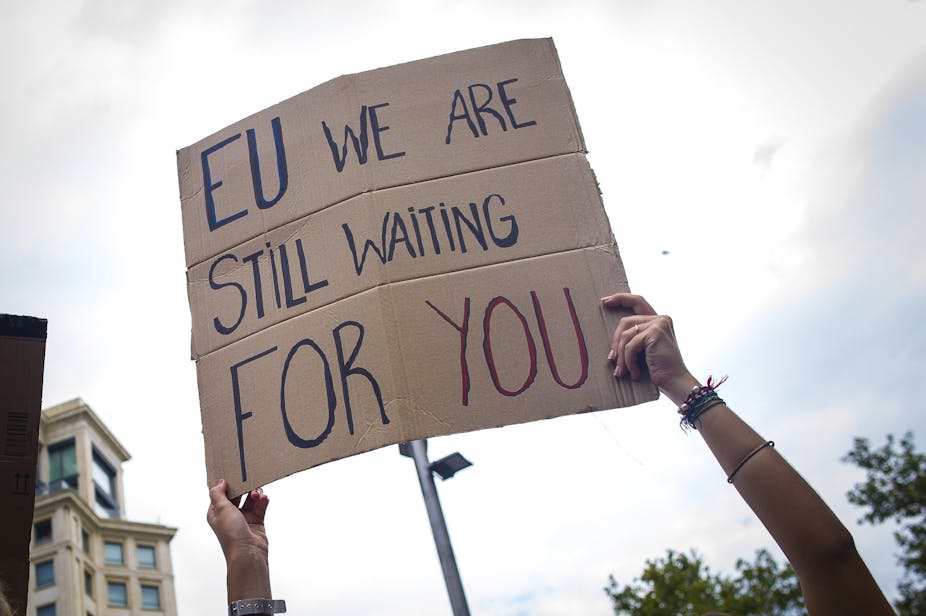Until the events on October 1, in which images of police violently preventing people from voting in Catalonia’s referendum on independence were beamed around the world, the European Union kept a very uniform position: this is a Spanish affair.
After the confrontation of the Spanish police with demonstrators and voters, the European Commission called for dialogue, while maintaining support for the Spanish government. Some European leaders, such as the Belgian prime minister, went as far as outright condemnation of the violence.
The European Union has heard its share of lobbying on behalf of Catalan separatists. Not only does the regional government have a permanent office in Brussels, but Catalan nationalists have had representation at the European Parliament since 1989. Both in the build up to the first illegal referendum on Catalan independence in 2014 and the most recent one on October 1, the regional government sought to internationalise the events.
The EU’s stance
The position of the EU and the European leaders on Catalonian independence has been one of self-preservation. Separatism exists in France, Italy, Germany, Belgium and the UK – none of which want to encourage divisions at home by supporting the Catalonian separatist cause. According to this hypothesis, if the EU encouraged Catalonia to separate from Spain, whether because it was guaranteed EU membership or because the EU leaders intervened in favour of the separatist goals, Spain could reciprocate if separatism flared up elsewhere in the EU.
But this theory simplifies things substantially and assumes that the success of Catalonian separatism rides on whether EU leaders – or any other international entity, such as the UN – would recognise the region’s independence.
The EU requires that its members should guarantee “stable institutions guaranteeing democracy, the rule of law, human rights and respect for and protection of minorities”. If an EU member infringes that obligation, the EU can act following articles 2 and 7 of the Treaty of the European Union. Recent examples of this can be seen in the EU’s reaction to Hungary’s limitations of freedom of association and Poland’s limitations of independence of judicial power.
If the EU considered that the Spanish government had not allowed democratic expression in Spain, there is nothing preventing the EU Commission from initiating an infringement procedure.
Read more: Article 7 sanctions: a legal expert explains the EU’s nuclear option.
European leaders have repeated many times that Spain is a democracy with a very decentralised government that allows its citizens to express their will, even when this will is that of separation from the rest of the country. In fact, separatists are in power in Catalonia: the current regional government is a coalition of three parties which make up 72 MPs out of 135, but did not get the majority of votes in the elections of 2015. The laws governing the recent referendum were approved in violation of the relevant procedures by fast-tracking the approval process.
The Catalan government also went against the Code of Good Practice on Referendums of the Venice Commission, the very legal instrument on which it based the referendum process. Contrary to this code, the referendum was held in contravention of the Spanish Constitution and the organisation and procedure of the referendum was rudimentary.

European leaders are all too aware that since 1993, Spanish governments have been propped up by Basque and Catalan nationalists – in exchange, they have obtained more forms of self-government and financial concessions. As a result, the current situation has been helped by successive Spanish governments who have agreed to withdraw the presence of central government in the Basque and Catalan regions in exchange for votes from Catalan MPs in the Spanish parliament.
The forgotten victims of this conflict are the Catalans themselves, who for the most part – according to recent polling – want to remain Spanish, but are being used as pawns by their politicians. A democratic government with the goal of becoming a democratic, independent country does not send people to participate in an illegal vote so that it can get international attention with photographs of the rioting.
Unilateral declaration of independence
The law of the referendum foresaw that in the event of a majority in favour of independence, the Catalan government would unilaterally declare independence as the Republic of Catalonia. Following the referendum, the president of the Catalan government concluded that there had been enough support for independence and therefore he would soon make that unilateral declaration.
In the event of that declaration, the EU can only emphasise, again, that should Catalonia become a separate state, it would need to apply for EU membership. This is the same posture the EU adopted with regards to Scotland’s independence referendum and it’s logical since integration of a new member requires unanimity of the existing members. Spain, of course, could block it and it is to be expected that other EU countries would do too.
The EU should back Spain against separatists for two main reasons. First, because democracy means guaranteeing the rights of the citizens and enforcing the law. And second, because allowing disintegration of a country would only increase nationalism elsewhere.

